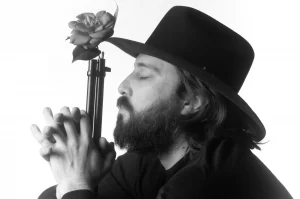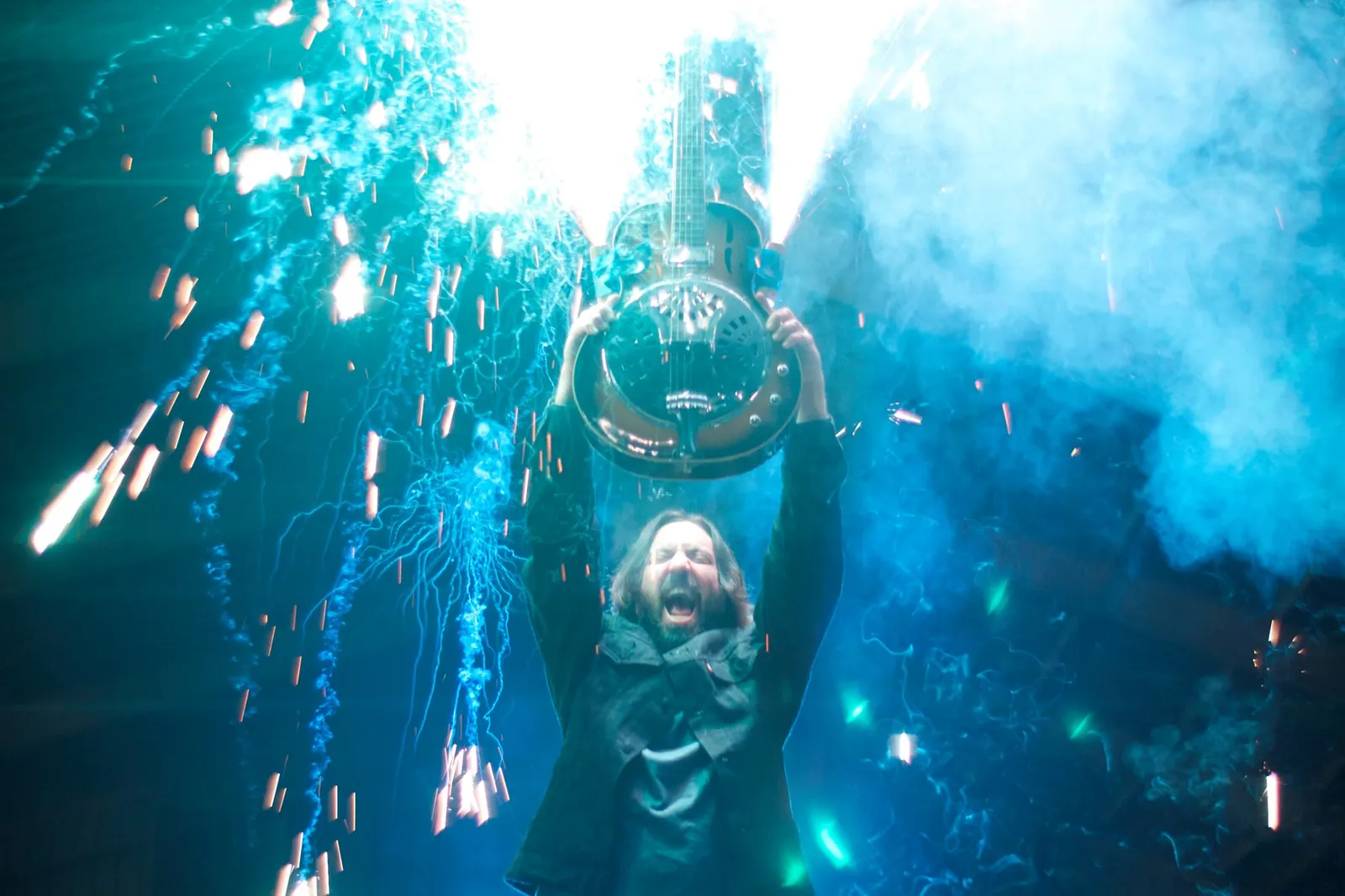Lafayette singer songwriter guitarist and writer Dege Legg a.k.a. Brother Dege passed away on March 8, 2024.
Legg wore several hats including day laborer, cabdriver, journalist and singer songwriter. In 1994 he started the rock band, Santeria, that was frequently featured in OffBeat reviews of albums House of the Dying Sun, and Golar Wash.
In 2010 Legg released his debut album Folk Songs of the American Longhair to critical acclaim with Uncut magazine giving the album a four-star review. The music was described as melding elements of folk, Delta blues, punk, rock, metal and outlaw country.

Dege Legg. Photo from Brother Dege website.
OffBeat’s Christopher Weddle said of Legg: “music that feels of the earth… this is working man’s music—not a nine-to-five working man, but an up- and-out-before-the-sun-rises working man. Dege Legg is certainly not afraid to tackle the darker sides of humanity both lyrically and in the music crafted as part of his unique blend of roots music that he dubs psyouthern.” Dan Willging in OffBeat said of Brother Dege’s 2014 release How To Kill a Horse, “it’s one of those rare, deeply layered records that just doesn’t describe the scene, it literally whisks you there in a slightly mentally altered state without warning. Though it’s heady sonic art and masterfully done, Dege is more than just your studio effects-only kind of guy. His cerebral, thought-provoking lyrics are rife with mystical imagery and eloquent phrasing, not to mention shrouded in mystery. There’s usually a core concept lurking around such as overcoming insurmountable obstacles and how letting go leads to liberation.”
Legg’s song “Too Old to Die Young” was hand-picked by Quentin Tarantino to be featured in the 2012 movie, Django Unchained, which received an Oscar nomination for its score.
In 2020, Legg published “Cablog: Diary of a Cabdriver,” which chronicled his five years of driving a cab in Lafayette. The memoir recounts his cab encounters, including the grieving parents of a serial-killer victim, a gang of ex-Holiness Apostolic Pentecostals, James Taylor’s band, and a parade of characters. Former OffBeat writer Scott Jordan wrote the forward to the book, as follows:
“I was suitably impressed and pegged Santeria as a Louisiana band-to-watch in the national music-biz broadsheet Billboard magazine. That sparked some correspondence with Dege, and I kept tabs on him while writing for New Orleans’ OffBeat Magazine and Gambit Weekly. Santeria eventually broke up a decade or so later, but Dege soldiered on with similarly intriguing projects. When he founded Black Bayou Construkt, he proudly emblazoned the band’s logo on its touring van and painted it, of course, black. Nothing brightened my day more than seeing Dege rumbling around in this nocturnal warhorse straight out of MadMax.
The apocalyptic, mystical strain running through Dege’s music is no act. When I moved to Lafayette in 2003 to edit and write for the Independent Weekly, we talked and visited more frequently—and at times I feared for his safety. With his guerilla DIY ethos hatched as an ’80s kid building illegal skate ramps and devouring fringe ’zines, Dege hatched one gonzo project after another. He lived in and filmed music videos in the seediest motel in town. Commandeered remote cornfields and obsessed over crop circles. Documented his fixation with UFOs. Jerry-rigged a dobro with fireworks. To say he lived life firmly on the edge would be an understatement.
That’s why I was highly skeptical when a colleague told me that Dege wanted to talk to me about a job opening at the newspaper. It was for a calendar coordinator and arts and entertainment writer, the unglamorous position of compiling nightclub listings and pitching story ideas in hopes of earning writing clips. I couldn’t wrap my brain around him working in an office. I quasi-interviewed him for the position, essentially asking, “Are you sure you want to do this?”
Dege had been driving a taxi at night for steady-ish income. Lafayette, despite its charms and having been named “The Happiest City in America,” has some dark corners. Grinding poverty and shaky public education snake their way through side roads and surrounding towns. Dege, true to form, was regularly finding himself behind the wheel for unimaginable scenarios with unimaginable customers in unimaginable locations. The dystopian strangeness of some of his fares compelled him to keep a diary, journal, cablog.
Like many dedicated songwriters (see: Springsteen, Bruce; Cash, Rosanne; Morrissey, Bill), it turns out that Dege is a talented writer, period. Excerpts from his cablog was one of the first projects we worked on together after he earned the gig at the Ind, and he went on to publish numerous memorable pieces, especially a cover story for which he embedded himself in numerous homeless camps on the hidden side of Lafayette’s train tracks. Dege’s prose and interests reflect the man himself: gritty, honest, unflinching, questioning and empathetic.
Our newspaper days are long behind us, and Dege is currently known worldwide as Brother Dege, thanks to the inclusion of his song “Too Young to Die” in Quentin Tarantino’s Django Unchained. A quarter century after our first encounter at a squalid Check Point Charlie show, Dege now sounds like a bona fide Delta bluesman, stomping his heel and howling out his original chronicles of pain and restlessness, armed with his wandering spirit and a Resonator guitar. Welcome to riding with Dege. Strap in.”

Dege Legg. Photo from Brother Dege website.
Social media comments are as follows:
Dave Jordan, singer songwriter and guitarist
“I’m very bummed to hear of the passing of Brother Dege Legg. I didn’t know him well, but our paths crossed a few times, both in LA and out on the road. Some people are just saturated in authenticity and Dege dripped of it. A killer guitar player and consummate artist, relentless in his originality and genuine to the core. The kind of artists that most resonates with me. Peace and love to his family and to my many friends who knew him much better than I did. Fly high, Brother Dege, show ’em how it’s done on the next level.
Laura Huval, singer songwriter and guitarist
Woke up to some devastating news. RIP Brother Dege. I was honored to know you and collaborate with you. Music and the world won’t be the same without you.
Sweet Cecilia (Callie Guidry, Laura Huval, Maegan Berard) – Grammy nominated band from Cecilia, Louisiana
Brother Dege, you were always so sweet, kind and supportive. One of the best nights was when Sweet Cecilia and Bonsoir Catin hopped on stage and shouted and sang in unison and harmony with the Brethern. RIP Dege. We are all heartbroken. There are no words that can do justice to you as a musician and as a human being. Thank God for Dege.
Scott Jordan, journalist
Absolutely gutted at the senseless and tragic news of Dege Legg’s death. We’ve ran in the same circles for a long time, and I still consider it the highest honor that he asked me to write the foreword for his Cablog book.
Funeral arrangements are pending.



